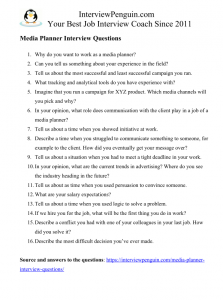Success of an advertising campaign is determined by many factors. Everything starts with identifying the target audience and understanding their behavior and habits. Then we should determine the best media outlet for the campaign, do the first run of ads, evaluate the results, optimize the ads and landing pages, do the second run, and optimize again…
Working as a media planner, you may be responsible for the entire process (and everything that relates to it). Or, belonging to a bigger marketing team, you may take care only of one or two tasks from the process, such as identifying target audience and choosing the right media channels accordingly.
Let’s have a look at the questions you may face while interviewing for this interesting and well paid position.
Table of Contents
Why do you want to work as a media planner?
You can refer to several reasons at this point. First one is your experience in marketing and advertising. You’ve been in the field for some time, worked on different campaigns, had your share of successes and failures.
Understanding your field well, and having some experience with a variety of media channels, and perhaps also some connections in the business, you see this job as a great match, at least at this stage of your professional career.
If you do not have much experience, you can talk about your education, passion for marketing and advertising, or your skills and personal traits that make from you a good job candidate. Ads are here to stay, though the ad formats and channels evolve constantly. You find it fascinating to work with the subconscious of the consumers. Trying to hit the right spot with your campaign, you hope to motivate them to make a purchase, or to take another desired action.
And you have excellent communication and analytical skills, are willing to learn and work hard, and see no reason why you could not become a great media planner in the near future.
Can you tell us something about your experience in the field?
Experience is pivotal in this interview. But you do not have to talk only about your experience from some other advertising agency. If you have such an experience, however, talk about the campaigns you worked on, tools you used, media channels you worked with.
You can actually prepare a portfolio of your best works, which in this case means brief illustrations of the campaigns you worked on, and more importantly the results you achieved with them. A great ROI, excellent conversion rate, improving the brand awareness of your client, and so on. These are the things you should demonstrate with the help of your portfolio–if you achieved them, of course.
If you lack professional experience, you can still show them something. Maybe you grew your own YouTube channel to 100K subscribers. You found your niche, identified the target audience, and made a great content accordingly. After some optimization things finally clicked for you, and you see no reason why you shouldn’t achieve the same results working as a media planner, when someone else is paying for the campaign.
Remember that how you can describe your experience, and showcase your knowledge and skills while doing so, it’s actually more important than the experience itself…
Tell us about the most successful and least successful campaign you ran.
How do we define the success of a campaign? We must have some tangible goals before doing anything else. Then we should set the tracking properly, to be able to monitor the clicks and conversions or anything else. The results are certain metrics which determine the success, or failure of the campaign.
Eventually each campaign with positive ROI can be considered successful. And that’s exactly what you should talk about while describing your most successful experience in the field.
Explain the goal of the campaign, the budget. Tell them how you identified your audiences, and media channels to advertise on. Then you can talk about participating on the creation of creatives (if you participated), and on tracking the results, testing, and optimizing. Eventually you achieved great ROI for your client (or helped them achieve some other goal), and that’s exactly why you consider this campaign the most successful one.
The story is similar with the least successful campaign. Just you should do two things:
- Try to identify the reasons why you failed to achieve the goals, why it flopped terribly. Best candidate will accept the responsibility, and won’t blame their colleagues from the marketing department for the poor results.
- Specify one or two lessons you learned during this unsuccessful campaign, and how it eventually helped you to become better in your work.
What tracking and analytical tools do you have experience with?
First of all, you should emphasize the importance of tracking and optimization of the campaign. It actually makes no sense to run one without tracking it. Then you can talk about tools. Professional tracking tools such as Voluum or Thrive tracker can help you track virtually everything in paid campaigns. Google Analytics is also a goldmine, if you can set it up properly…
Tell them about the tools you’ve worked with before, and explain the core functionality. And if you do not have much experience with the tools yet, ensure them that you are tech savvy, and are sure that with the help of tutorials and guides you will quickly learn to work effectively with any tracking tool.
Imagine that you run a campaign for XYZ product. Which media channels will you pick and why?
The key is to show the a systematic thinking, and analytical approach to your work. Say that before anything else, you have to understand the goals of the campaign. Is it improving the product image? Is it brand awareness? Or is the goal to simply introduce the new product to the public?
Just then you should think about the target customer. Their gender, age, social status, etc. You should be able to point out the right media channels, at least for the initial tests, for each demographic group.
Another alternative is saying that you will try different media channels in your initial run, with a smaller budget, with proper reporting and re-targeting setup. After evaluating the initial results, you will be able to pick the winners and invest more heavily into your campaigns on the channels that yielded the best results in the initial tests.
Show them that while you have a good understanding for the market, and for different media channels, you still prefer to make data-driven decisions, to run your tests, and to continuously optimize the campaigns.
In your opinion, what role does communication with the client play in a job of a media planner?
You should give communication with the client the highest importance. First of all, the client bears the expenses for the campaign. They should be informed, and they should feel that the advertising agency communicates with them.
Secondly, without communicating with the client, you can hardly specify the goals of the campaign. And without having goals, you cannot move forward in your work. Hence it is important to communicate with them before, during, and also after the campaign.
Ensure the interviewers that you will not ignore the client once they send the money. On the contrary, you will keep in touch, informing them about the progress, and discussing some improvements and changes with them along the way.
Business has always been about relationships. Building good relationship with the client, as the two of you work together on the campaign, you are actually helping to secure future deals for your employer…
Other questions you may face in your media planner job interview
- Tell us about a time when you showed initiative at work.
- Describe a time when you struggled to communicate something to someone, for example to the client. How did you eventually get your message over?
- Tell us about a situation when you had to meet a tight deadline in your work.
- In your opinion, what are the current trends in advertising? Where do you see the industry heading in the future?
- Tell us about as time when you used persuasion to convince someone.
- What are your salary expectations?
- Tell us about a time when you used logic to solve a problem.
- If we hire you for the job, what will be the first thing you do in work?
- Describe a conflict you had with one of your colleagues in your last job. How did you solve it?
- Describe the most difficult decision you’ve ever made.
- …..
* Special Tip: If you are not sure how to answer the questions from my list, or experience interview anxiety, have a look at our Interview Success Package. Up to 10 premium answers to basically all tricky questions you may face in your Media Planner job interview will help you streamline your interview preparation, find the right words in every moment of the interview, outclass your competitors, and eventually get the job. Thank you for checking it out!
Final thoughts
Media planner is a popular job title, and you will typically compete with many other people for the position. Your experience, and especially the way in which you describe it (with the help of your portfolio) plays a pivotal role in this interview.
However, it doesn’t mean that a great portfolio guarantees you the job, or that you can’t succeed without having a lot of experience under your belt.
Prepare for the scenario based questions, and try to learn something about their media company (advertising agency). Who are their principal clients? What sort of campaigns do they run, and on which channels? Any major successes or flops in the recent years?
The more you know about them, the easier it will be to connect with the hiring managers, and to answer some questions that relate to their company and business. I hope you will succeed, and wish you good luck!
Matthew
* You can also download the full list of questions in a one page long PDF, and practice your interview answers anytime later:

May also interest you:
- Content Strategist interview questions.
- Social Media Manager interview questions – Two or three questions overlap with the interview for Media Planner. Learn how to deal with them.
- Salary negotiation tips – Get as much as you deserve when you start talking salary with the employer.

